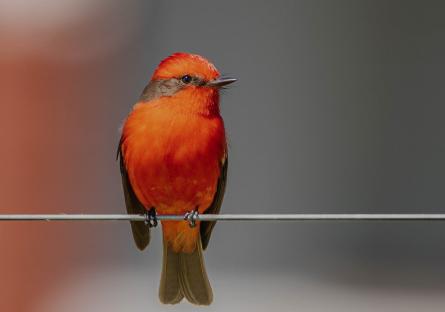This article appears for archival purposes. Any events, programs and/or initiatives mentioned may no longer be applicable.

Spring is in full swing! Flowers are blooming and birds are singing. Crack open a window and you’ll hear the melodious warbling's of dozens of different bird species pleading their romantic cases. Now’s the time of year when you could see a shockingly bright Vermillion Flycatcher dart across the Arizona skies. It’s a great moment to bird-watch, if you’re so inclined. If you haven’t done any birding before, you may want to consider giving it a try: it’s a rewarding hobby with some surprising health benefits. Read on as we explore the benefits of birdwatching.
Bird Song is Soothing
There’s something almost intrinsically pleasing to the ear about bird song. Whether it’s the tremulous chirp of a quail or the deep nocturnal hoot of an owl, it’s like a little fragment of nature’s music to enjoy. Research has found that we have a powerful response to bird song: studies found that many people reported an improved mental state and a decrease in depression when exposed to singing birds. Further research suggests that the mere presence of birds is enough to have an impact on one’s state of mind. Studies into bird abundance in urban neighborhoods found that people who lived in areas with a higher concentration of birds displayed lower levels of anxiety, stress, and depression.
It Gets You Moving
If you’re living a sedentary lifestyle and need an excuse to get moving, birdwatching is a fun reason to leave the house. Birding involves quite a bit of walking. Staying in one place to see birds rarely works out; it’s in roving about, scanning the tree line and exploring nature, that yields fine feathered rewards. Birding is a great way to get your 10,000 steps in while enjoying the splendors of nature.
Plenty of Sunshine
Birdwatching is an outdoor activity, which means you’ll spend a fair amount of time soaking up sunshine. This is mostly a good thing: being out in direct sunlight for 10-30 minutes will stimulate your body to produce more Vitamin D. Exposure to direct sunlight can also stimulate your brain’s production of serotonin, a hormone that helps you feel calmer, relaxed, and more focused.
That being said: too much sunlight could lead to some long-term problems like premature aging and increased risk of skin cancer. That’s why it’s important to wear sunscreen when you plan to be outside for a while.
Enhanced Cognition
Being out in nature can be a balm for our troubled minds. Research has found that interacting with nature provides cognitive benefits. Spending time outdoors can improve one’s ability to concentrate, encourages cognitive flexibility, and enhances memory retention. Being out in nature can also lower blood pressure.
Flock Together
Birding is often thought of as a solitary activity, but it can be a community-minded activity. There are local birdwatching groups across the country that regularly meet to go on hikes and nature excursions as well as host meetups where they share facts about birds, swap birding stories, and get to know one another. Birding could be a way to meet new people, make friends, and form lasting bonds that can make you feel less lonely, which in turn could improve your life expectancy and overall quality of life.
Form Deeper Connections With Your Home
Few things can make us feel more intimately connected with our environment like fostering an awareness of the local flora and fauna. Birding encourages you to better understand your surroundings: the local wildlife, the plants that birds rely on to survive, the things that prey on them, and how humans impact those environments. If you feel alienated and isolated, getting out into the world and seeing the interplay of nature happening all around could be a source of comfort and encouragement to you.
Getting Started
One of the major benefits to taking up birding is that it’s a low-cost activity. You really only need two things to get started: a pair of binoculars and a bird guide. There are numerous books and apps available that can help you identify birds. Once you have your tools, you just need to do a little research. Find out what birds are native to your surroundings. Check the time of the year they are most active: some bird species will migrate, so you’ll want to make sure you aren’t out there scanning the horizon when they’ve all left for the winter.
You’ll also need to practice patience! Patience is the number one virtue of birding. You can’t rush results. Part of the joy and Zen of the practice is giving up control. You’re on the bird’s time now. They’ll show up or they won’t; there’s nothing you can do about it either way. If you’re looking for a way to hone that concentration muscle, birding could be right for you.
And finally: don’t forget to stay hydrated! You may be outdoors for an hour or two, so drink plenty of water and maybe pack a snack or two to keep your energy up.
Article by Austin Brietta
Want more wellness tips? Check out these stories: